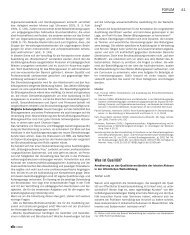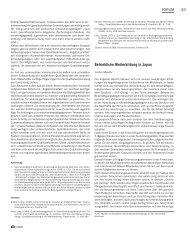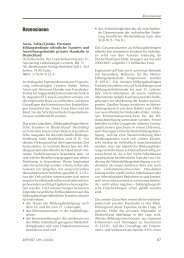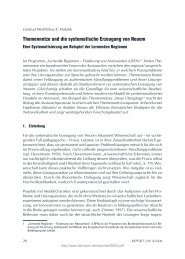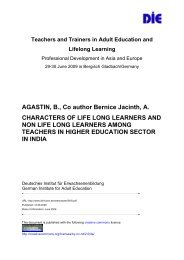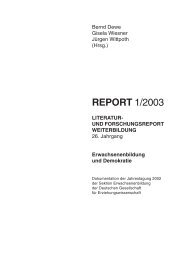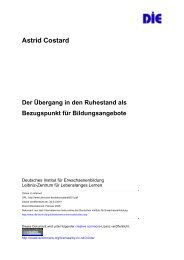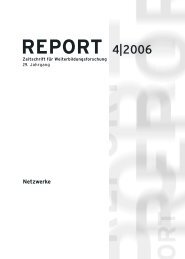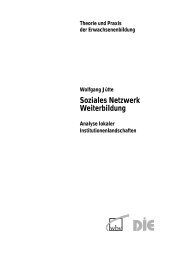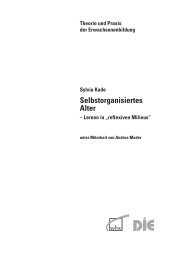Accreditation of Prior Experiential Learning (APEL)
Accreditation of Prior Experiential Learning (APEL)
Accreditation of Prior Experiential Learning (APEL)
You also want an ePaper? Increase the reach of your titles
YUMPU automatically turns print PDFs into web optimized ePapers that Google loves.
2. A Changing Higher Education?<br />
Socio-economic changes in post-Enlightenment modernity have led to a reshaping<br />
and transformation <strong>of</strong> higher education systems from elite to mass-based institutions<br />
(Trow 1973; Scott 1995). As Scott argues: “The growth <strong>of</strong> mass systems is taking place<br />
against a background <strong>of</strong> socio-economic transformations that are both rapid and pr<strong>of</strong>ound<br />
… New social forms and economic patterns are seen as alternative to, not extensions<br />
<strong>of</strong>, the forms and patterns generated by Fordist mass-manufacturing and the bureaucratic<br />
Weberian state. Mass higher education, it has been argued, is also more<br />
than the linear successor <strong>of</strong> elite higher education because sociologically and epistemologically<br />
it represents a break with past continuities” (Scott 1995, p 172).<br />
The purpose <strong>of</strong> universities as elite research institutions socialising and reproducing a<br />
young, middle class minority as the next generation <strong>of</strong> intellectuals, is being questioned,<br />
redefined and reconstructed. “Academic” knowledge as traditionally provided<br />
by universities is perceived in some quarters as no longer adequate for a knowledge<br />
society requiring new demands and wider types <strong>of</strong> knowledge. Mass higher education<br />
introduced a new form <strong>of</strong> learning in universities, although elite institutions managed<br />
to maintain their structures and culture, characterised by a broader student base and<br />
curriculum. Scott (1995) highlighted a number <strong>of</strong> “procedural and structural” changes<br />
which universities have to undergo in order to become mass institutions such as modular<br />
degree and credit transfer schemes, the transformation <strong>of</strong> continuing education,<br />
Access courses and partnerships with non-higher education institutions:<br />
<strong>APEL</strong> is one mechanism for enabling “non-traditional” adult students to enter higher<br />
education. Inevitably in the UK, and elsewhere, the new form <strong>of</strong> higher education led<br />
to declarations <strong>of</strong> “more means worse” with concerns raised about quality and standards.<br />
In the UK Scott (2000) argues that we have now moved beyond mass higher education<br />
to lifelong learning as the boundaries between the various post-compulsory sectors<br />
break down and merge. New types <strong>of</strong> universities have emerged: virtual and corporate.<br />
In this scenario Scott maintains that higher education courses are being <strong>of</strong>fered<br />
outside traditional higher education institutions: “Not only have higher education institutions<br />
and systems, certainly as presently constituted, reached the limits <strong>of</strong> their own<br />
usefulness; they are also being actively subverted by new conceptions <strong>of</strong> learning, knowledge<br />
and organization. In practical terms, this suggests that while a relatively conventional<br />
higher education, such as Britain still has, can comfortably cater for up to a third<br />
<strong>of</strong> the age group, new approaches and institutions are needed if participation is to be<br />
widened to half or more <strong>of</strong> the eligible population” (Scott 2000, p 41).<br />
In a lifelong learning version <strong>of</strong> higher education, education and training become blurred.<br />
“The pattern <strong>of</strong> higher education development with which we have been familiar in<br />
the twentieth century – in effect, the expansion and (limited) liberalization <strong>of</strong> the university<br />
core combined with the development <strong>of</strong> ‘additional’ rather than alternative,<br />
56


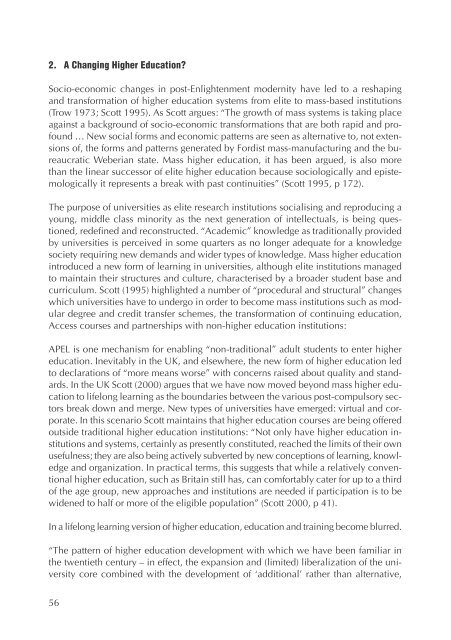
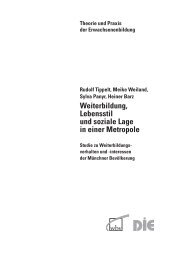
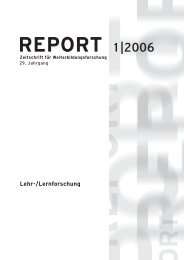
![PDF [KB 892] - Deutsches Institut für Erwachsenenbildung](https://img.yumpu.com/7495168/1/144x260/pdf-kb-892-deutsches-institut-fur-erwachsenenbildung.jpg?quality=85)
